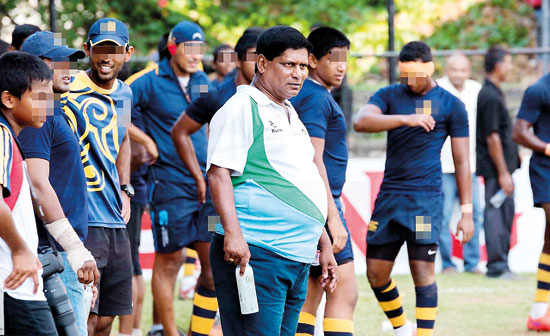I joined to complete a task, not to get bullied – Martis
Sri Lanka national rugby team head coach Sanath Martis who resigned following the two-match test series against New Zealand U85kg team, stated that his decision to step down was prompted by criticism directed at him, his coaching staff, and the team selectors by Priyantha Ekanayake, head of the National Sports Council.
“The Chairman of the National Sports Council openly criticised the national coaching staff and selection committee, and threw us under the bus with his comments,” Martis told the Sunday Times.
The New Zealand U85kg team overshadowed the Tuskers’ recent successes by defeating them 50-10 and 32-6 in matches played in Nittawela and Colombo. Following these defeats, Ekanayake, a former rugby icon and current Chairman of the National Sports Council, launched a scathing attack on the coaching staff and selectors.

As the Head Coach Sanath Martis guided of Sri Lanka 15s team to an unbeaten success in the Asian circuit since 2024
“We had just beaten Malaysia and had a great opportunity to challenge the New Zealand team. They didn’t know who we were, we should have fielded our best team. You can make a few changes, but not wholesale. Everyone expected us to do well,” Ekanayake told reporters, expressing his disappointment prior to the second game against the “Small Blacks.”
Martis defended himself and his support staff. “I think we all did a good job as a unit, and I’m proud of it, the boys and my support staff,” said Martis, who stepped down last week after submitting his resignation to Shemal Fernando, the Competent Authority of Sri Lanka Rugby.
“It’s not in the letter, but I verbally told the Director General the real reason for my resignation. It’s because of the open comments made by the Chairman of the National Sports Council. As a coach, I have a reputation and dignity, as do my colleagues. I joined to complete a task and serve my country, not to be bullied by armchair critics or impractical naysayers,” he added.
Currently serving as Head Coach of St. Peter’s College and Colombo Hockey and Football Club (CH&FC), Martis has been involved in rugby coaching for nearly 37 years. He has built a reputation as a shrewd tactician, leaving his mark at various institutions and clubs before taking charge of the Sri Lanka 15s side in March last year.
Under his leadership, the Tuskers maintained an unblemished record, defeating India (45-10) in the semi-final and Kazakhstan (45-7) in the final of the Asia Rugby Division I Championship held in Colombo. Seeking advancement to the Asia Rugby Top Tier to compete against Hong Kong, South Korea, and the United Arab Emirates, Sri Lanka faced Malaysia on April 19 in a repechage match, recording an impressive 59-19 victory before a packed home crowd. This triumphant comeback after almost a year was attributed to the strategic planning of Martis and his coaching staff.
“Last year, against India and Kazakhstan, I noticed that players tend to relax when their positions are not challenged. With that in mind, we invited 60 players to attend training, as it had been almost 12 months since we were a unit. Some players may have lost touch, and with other factors to consider, we gave deserving players the opportunity, aiming through to the Asian Championship 2025,” Martis explained, outlining his team’s long-term vision despite their honorary appointments being short-term.
The two-Test series against New Zealand U85kg was announced during the same period when the Sri Lanka squad was preparing for the repechage game against Malaysia. Martis and his coaching staff—including Dushanth Lewke and Saliya Kumara as Assistant Coaches and Rohan Chinthaka as Manager—were tasked with preparing the Tuskers for these challenging matches.
“We, as the coaching staff, never looked for excuses. Whenever we faced any shortage of equipment or facilities, it was simply a matter of coordinating with the Chef-de-Mission, who always found a solution. All of us—the coaching staff and the players—took on the challenge with the true passion of representing our country, and no one was concerned about money or rewards,” Martis recalled, expressing great esteem for his colleagues and players.
Following Sri Lanka’s defeats against the New Zealand team, speculation began circulating on social media platforms that players and coaches were not properly compensated for their efforts, despite the generation of substantial funds through sponsorships and endorsements.
“I never expect payment to coach my country, and I’m sure Lewke, Saliya, and Rohan share the same perspective. The players were highly passionate about wearing the national jersey and representing the country; we all functioned as a unit. It’s a great honour and privilege for us. My only concern is seeing my country advance further in rugby,” Martis emphasised.
Rugby experts, including Martis himself, recognise that challenging New Zealand at any level is one of the greatest tests in the sport. For winning to become habitual, Sri Lanka may need to look beyond the Asian region, which was the purpose behind the matches with New Zealand U85kg—an initiative by Inthi Marikkar and his team.
“The two games against New Zealand U85kg provided valuable opportunities for our players and coaching staff. I had already designed a game plan for our upcoming match against South Korea, but I suppose that’s now too late. There are coaches out there, whether better than me or not, and if my successor wants my input, I’m always willing to share,” stated Martis.
He acknowledged the support of many individuals, from Tony Amit, who initially recommended him for the coaching position in 2024, to the Father Rector and Rugby Foundation of St. Peter’s College, who granted him permission to focus on his national duties despite the ongoing Schools Knockout Championship.
The resignation marks the end of a brief but successful tenure for Martis, whose coaching acumen had reinvigorated Sri Lankan rugby on the international stage before criticism from sports administration officials prompted his departure.


